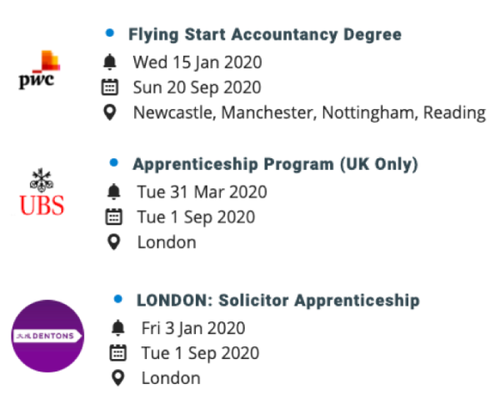
Apprenticeship Levels Explained (Levels 2-7)
With university fees constantly in the news , it’s no wonder that savvy young people are looking elsewhere to find paid qualifications and gain real-world experiences in the world of work. As of 2019, tuition costs amount to approximately £50k for a typical degree but with no guarantee of employment as new graduates enter an extremely competitive job market .
Apprenticeships have been around for generations as master craftsmen passed on their skills and knowledge to the younger generation but these tended to be hands-on roles.

Nowadays, there are myriad alternative career pathways open to students such as paid apprenticeships to become a solicitor with Dentons , investment banker with UBS or even an accountant with PwC !

And these are just some of the companies willing to invest in bright young people who understand that talent doesn’t have to come directly out of the graduation halls of universities.
The Government has laid out strict guidelines about what apprentices can expect from their providers during the programme so you can rest assured that you are part of a reputable course of education.
However, the different apprenticeship levels can be confusing so here is our guide to understanding what they mean in simple terms, along with some examples of companies who offer opportunities in these areas:
Level 2 Apprenticeships (Intermediate)
Equivalent to 5 GCSEs or National 5s (Scotland)
Students typically work full-time with an employer whilst studying at a college or other education provider.
EXAMPLES : View current level 2 apprenticeships or visit the Government website .
Level 3 Apprenticeships (Advanced)
Equivalent to 2 A-Levels or Highers (Scotland)
These apprenticeships generally last 24 months and enable you to develop work-based skills and experience in a particular job and sector, as well as gain the next step in your qualifications.
EXAMPLES : LEYF offer Level 3 childcare apprenticeships; Harrods offer a Level 3 School Leaver Programme . View more advanced apprenticeship opportunities here.
Level 4/5 Apprenticeships (Higher)
Equivalent to a foundation degree (HND or NVQ)
These are very competitive because school leavers as well as adults in work can apply for this type of apprenticeship. At the end of the course, apprentices are assessed on their academic learning as well as their on-the-job learning. Fees are co-funded by the government and the employer.
EXAMPLES : Google Software Developer Apprenticeship; IBM Software Developer - register interest here . More Higher Apprenticeship opportunities here.
Level 6/7 Apprenticeships (Degree)
Apprentices qualify with a fully-recognised Bachelor’s Degree (level 6) or Master’s Degree (level 7)
In 2015, a new type of apprenticeship was introduced: one in which employers or training bodies collaborate directly with universities. Together, they aim to provide apprentices with in-depth academic knowledge that is combined with up-to-date labour market workplace experiences.
The tuition fees are fully-funded by the company but you must still apply through UCAS .
EXAMPLES : Business or Technology degrees with PwC, Cyber Degree with GCHQ, Consultancy, Business and Law with Deloitte or Technology degree with J.P. Morgan. More opportunities here, on UCAS or on the Government website.

Ultimately, you have to decide where your passion lies and consider your personality when looking at your options after school/college.
Uptree is always here to help you by providing incredible opportunities for you to meet professionals face-to-face at work experience days and networking events or by offering you tailored advice with our application masterclasses, hosted by top companies.
You can view these events through your free Uptree account - we always love to hear from you so do get in contact with us if you have any success stories or advice for other young people: info@uptree.co
By Tamsin Dewhurst
Published on:
Thu 12 Dec 2019